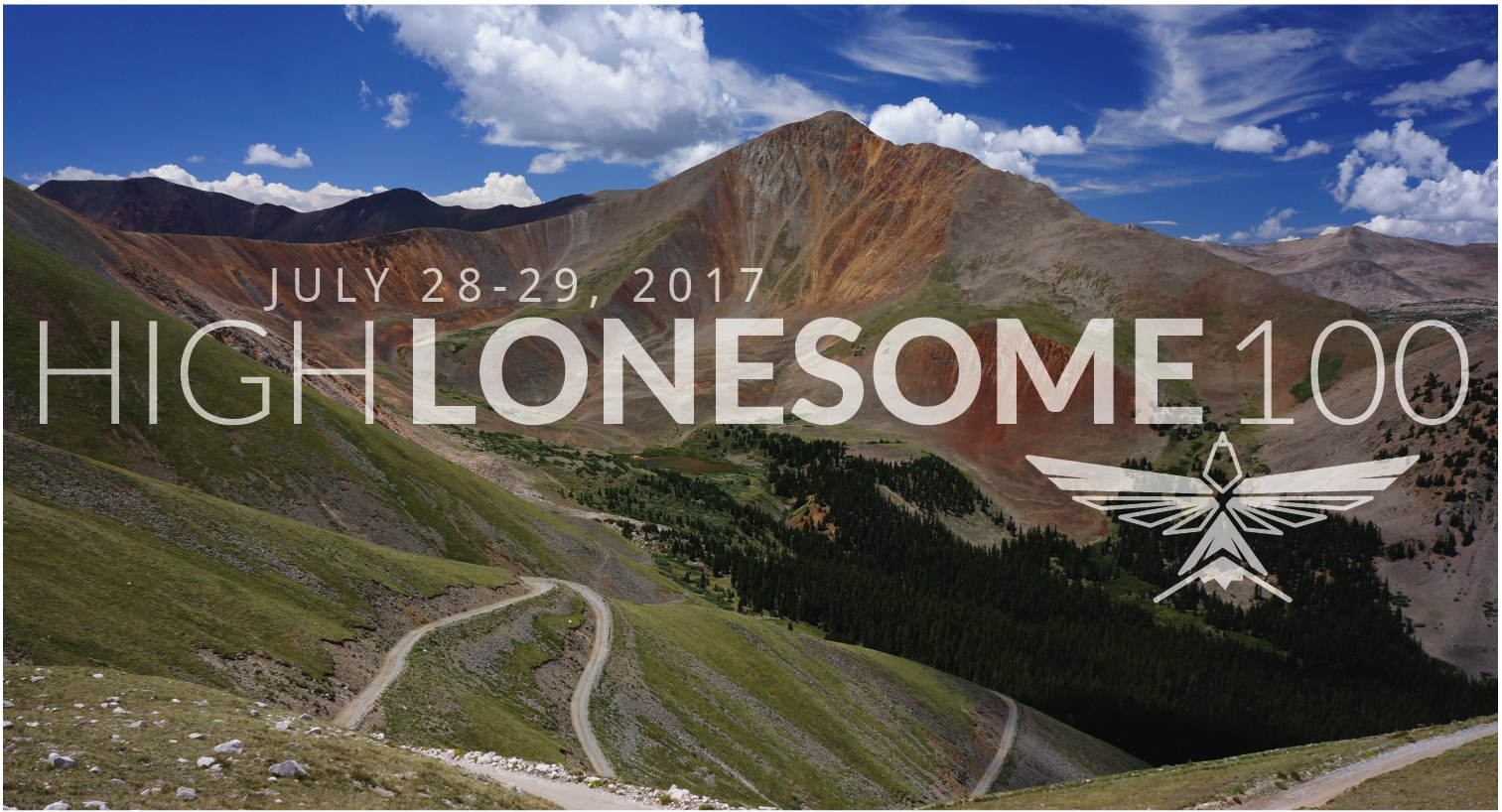
We staggered up the last few steps in the dark to the top of Monarch on the Continental Divide trail. A relentless wind slapped me in the face, and kept on slapping. A chill burrowed into me despite the wool shirt, rain jacket, gloves and buff. I couldn't see more than three feet in front of me; it wasn't fog, we were standing in a cloud. I turned back to Aaron, now nothing more than a diffuse headlamp glow and a voice in the dark.
"We gotta get the hell off this ridge."
We broke into a run, anxiety fueling our effort. We hadn't eaten anything in several hours. We were wet with sweat in the cold, constant wind. Slowing down could mean hypothermia. The day before had been perfect.
How the hell did we get here?
5:45 AM, Friday
Hundreds of people milled around in the dawn chill at the campground on Mt. Princeton. Pictures were taken; all smiles. Seventy-three of this crowd were preparing to toe the line of the inaugural High Lonesome 100. I was one of them.
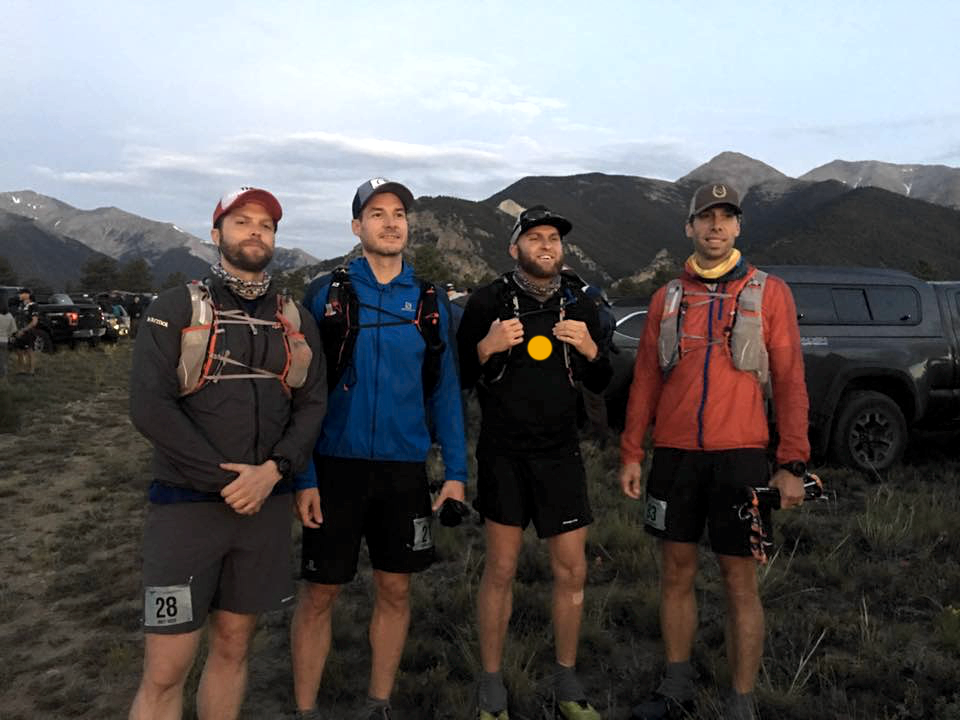
This was my first one hundred. Hundred-miler. Hundo. Finally hunting some big game. A few months prior I had no intention of being on the side of that mountain, but a successful fifty-miler seduced me to strike while the iron was hot. Besides, all my buddies would be there, and who doesn't like a little peer pressure. I got on the waiting list and within a few weeks I was committed.
At 6:00 AM, to the crack of gunfire, we rushed out of the campground in a mass and expelled our nervous energy on a steep downhill road towards the Colorado Trail. After a few miles the paved road degraded into a wide, flat, dirt path. We clicked off several quick miles before the real hunt began.
A steep ascent marked the beginning of the Colorado Trail. I'd be lying if I told you I remember it this way. I only recall this ascent the way back, with ninety-four miles behind me. It was an easy climb going out; it would be a quad-killer coming back.
We peaked out on the initial climb, and were rewarded with some nice, flat, runnable terrain of Colorado Trail. It didn't take long to make it to Raspberry Gulch, the first aid station.
By now our group of runners, all flatlanders from the Atlanta-area, had split into their respective factions. TJ had spent the better part of a month in Colorado, and had acclimated well enough to take an early lead. We would see him only once more before the finish. We'd instructed our crew to get some sleep, get their supplies, and skip these first few aid stations; we'd catch up with them around mile twenty-five. We filled up on water, grabbed a few snacks (Nutella tortillas? Hell yeah), and headed out for our first big climb: Antero. 9 miles ahead.
It didn't take long for the going to get tough. Aaron and I ascended the trail into ever thinner air. We came across flatlanders and highlanders alike, all struggling to make meaningful progress up the long hike. Our easy run was reduced to a power hike, and then a trudge.
"I gotta take a picture of this!"
That was my excuse anytime I wanted to stop and breathe for a minute, and the scenery made it easy. We were surrounded by mountains, bare on top, green on their slopes, rocky at their bases. White snow pack salted the peaks, gathering in nooks and crannies between folds of the ridge. The melting ice formed a half dozen creeks, streams and waterfalls that poured off the sides of the mountain, rushing toward flatter terrain. It was a mountain paradise.
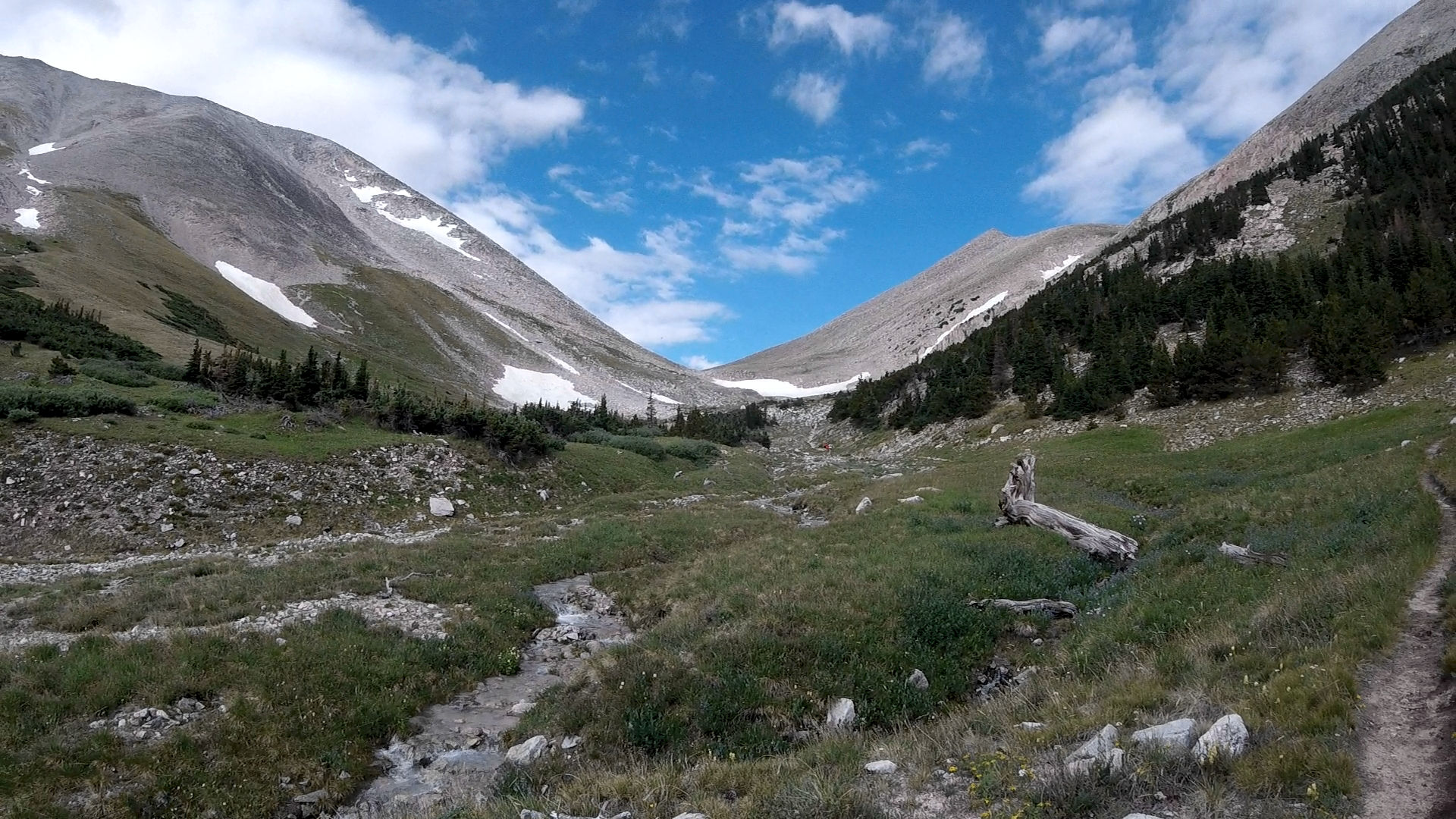
It was also a struggle. We worked with the mountain; we slowed to its speed. It might be the altitude talking, but by the time I reached the top I no longer felt spent. There was peace up there that I cannot describe.
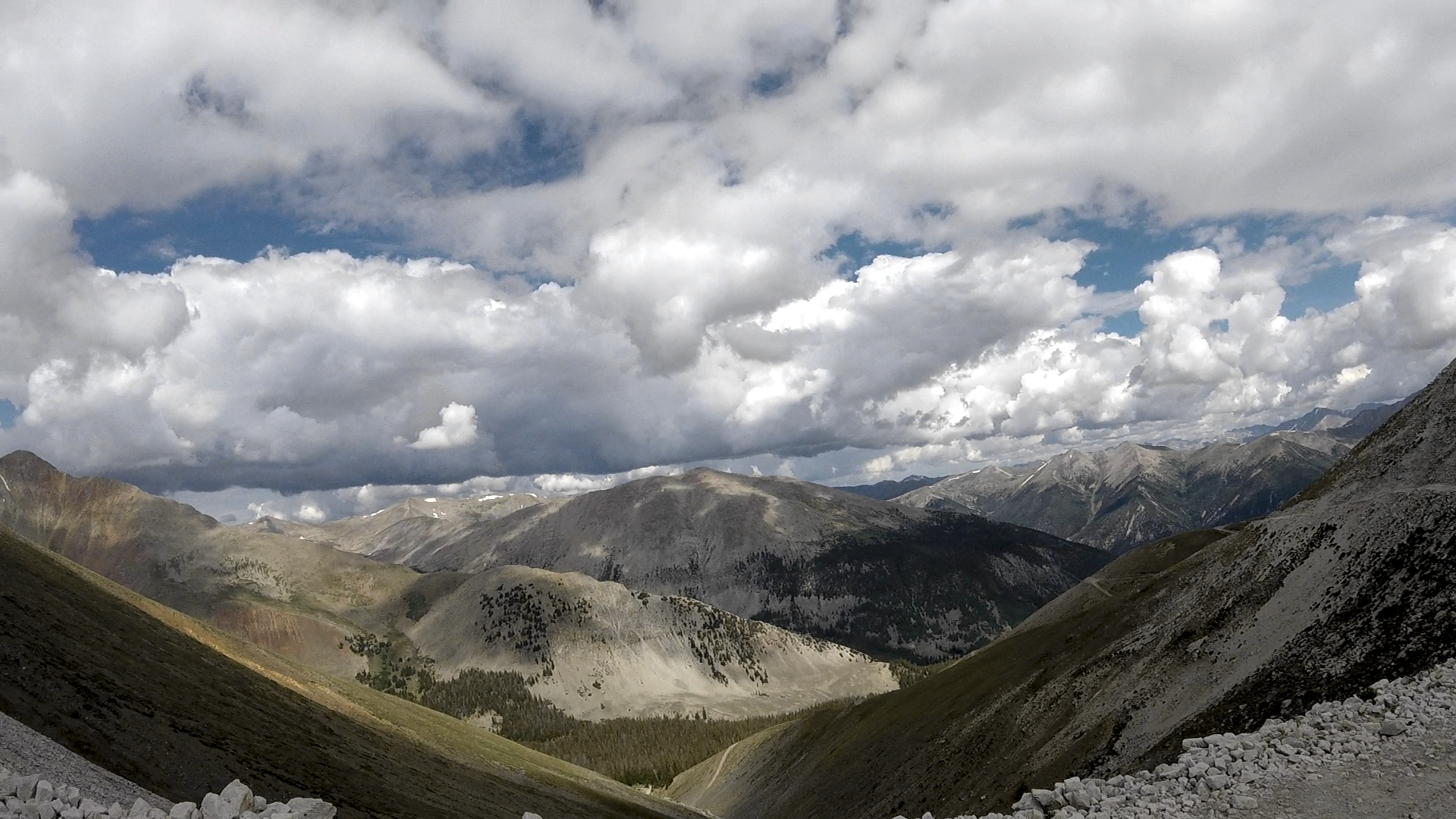
At the top, we looked down the side of the pass onto a steep jeep road. Perhaps a dozen rocky switchbacks wound their way downward toward our next aid station. If the previous five miles were toil, this was an effortless fall into a forested abyss. The scenery remained stunning, and with smiles on our faces we strode in to Antero aid.
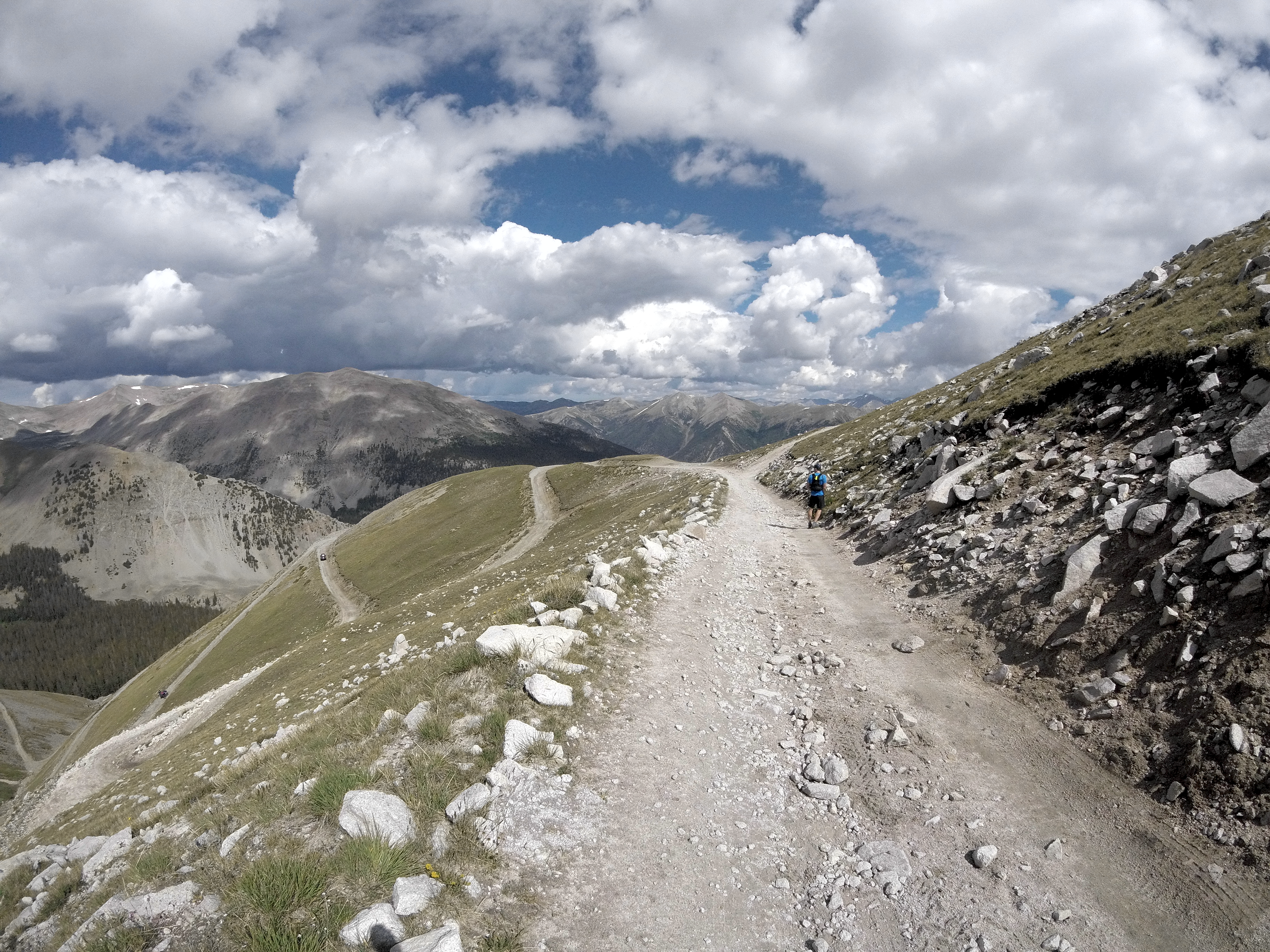
We made quick work here. The trail continued to descend out of Antero onto a roughshod jeep road. We passed several trucks on our way down. Several times the trail coincided with a melting snowpack stream; a taste of things to come.
After several miles of descent we turned a corner to hear cheering. Were we at the aid station? Had we covered eight miles so quickly? No. Several members of our crew had found a spot where the road and jeep trail met, parked, and waited for us to pass. It was uplifting, even if it did mean we still had several miles to go until St Elmo.
"I think the worst is over," I commented to Aaron.
"I ran parts of this course during training," another runner interjected. "I think the next out and back from St Elmo is the worst."
We were ignorant of the course other than the elevation profile and map. On the topo map it just looked like a couple of hills. How bad could it be? We contemplated as we ran up the Alpine road and past the creatively named Alpine lake. It didn't take long before we arrived at St. Elmo.
St. Elmo was supposed to be a ghost town; it looked anything but ghostly as we passed through. The hustle and bustle of runners, their crews, and race volunteers transformed it into a mountain metropolis again for the span of 24 hours. In the traffic we saw Anthony Lee and Mike Wolfe, the front runners, exiting on their way to Tin Cup and the rest of the race. They were hours ahead.
The aid station itself was on the trail about a half mile past the old town. Our crews had made quite a hike to get our gear from the parking area to the station itself, a thing which we'd hear a lot about later on. We took a quick break, our crew forcing us out after 5 minutes, and began the trek up and down to Cottonwood.
This was a low point. The rain hovered like an indecisive spectre. The clouds obscured much of the scenery. When you're on cooperative terrain you don't notice. But when the mountain feels like it's working against you, the weather does too. If it had been sunny and hot, I'd still be complaining. There is no solution to the problem other than to stash your ego in a pocket and get to work.
The going was slow, even coming down the backside into Cottonwood felt like work. How could two little blips on the map compare to the pass at Antero? We caught up with TJ, making his return trip from Cottonwood, looking strong. After a few minutes conversation, we let TJ continue and struggled on. At Cottonwood, our break was short. We headed back the way we came.
Out and backs bend your mind. On the way out you might complain a little. Your way back is a gripefest. Now you know where to complain. You just saw this. You know that "this next section" is muddy, slippery and steep. You're probably going to fall. There is that tree where the incline gets rough again. There is that clutch of grass that marks where all the damned rocks are. This kind of thinking is unavoidable on an out and back.
As we approached St Elmo, we caught up with Matt on his way out to Cottonwood. We did our best to lift his spirits without being dishonest about the beast in front of him. Forget the thin air and just keep moving. It was a struggle for everyone, and I know I learned something from it: on your way out, better to forget.
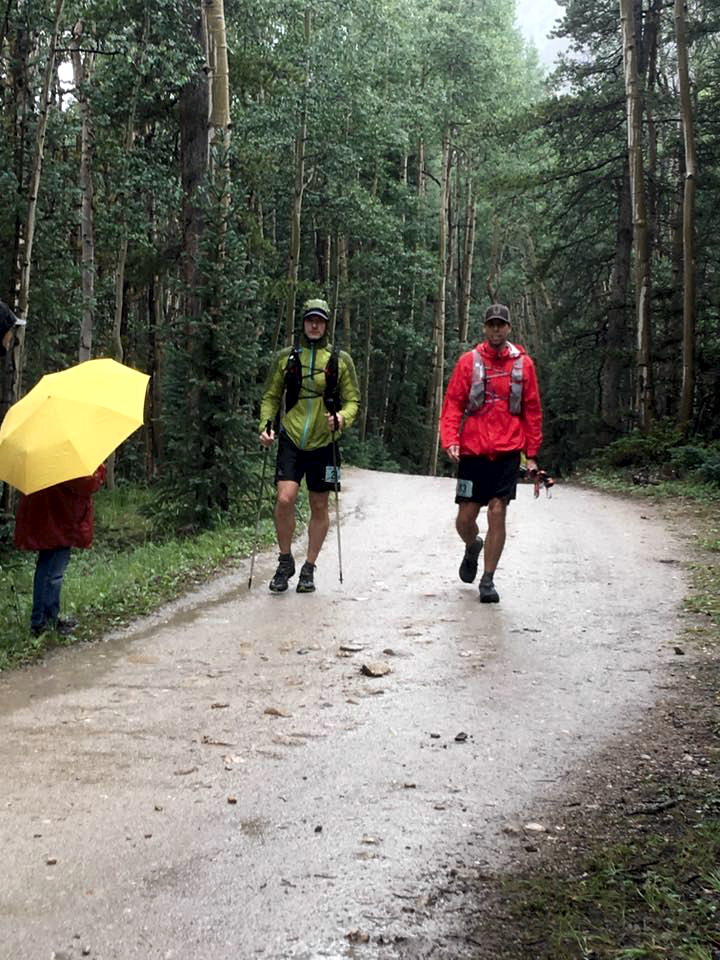
After powdering my joints on the descent, we met our crew again at St. Elmo. I was burning up despite the dreary rain and stripped off some clothes. It was getting late; the sun would be down before we arrived at the next aid station, so we grabbed our night gear. A quick shoe change later and we were on our way.
The next few miles of flat road flew by as daylight expired. We hit the water drop at Tin Cup, signaling the end of the road and the beginning of the ascent over the ridge to Hancock.
"Hey Yogi!"
Aaron's cry startled me. Our energy was flagging; conversation was limited to occasional grumbling. Sometimes about the knee-deep mud, other times the endless ascent over the ridge. It was getting too quiet, and we needed to make more noise to encourage our bear friends to stay far away.
"Hey BooBoo!" I called back.
"Go away, bears! Nobody likes you!"
"Nothing to eat here!"
"Fuck off, bears!"
It always devolves into profanity.
The bears weren't the only things we were cursing. As the snow melts in the mountains of Colorado, rivulets of ice-cold water form and wheedle down the mountain. Sometimes they mind their business and gently cross the trail. Other times they get lazy and just share the trail with you. I don't mind the occasional creek crossing, but after several miles of running in what can only be described as an "ankle deep kinda ice river", I was pleading for dry feet.
Speaking of snow, during this leg of the course we encountered our first snowpack. What's snowpack? It's a big slab of melting, soggy, but still somehow slippery snow that sprawls across the trail like Jabba the Hut. Its too big to run up-mountain of, and if you slip and fall you're going to end up "down mountain" pretty quickly. In my first encounter I tried to gingerly prancercise my way across and ended up with one pole jammed into the downhill side of the trail, the other end under my rib in a feeble attempt to slow my roll. A few feet of butt-waddling and I was back on dirt trail, but it was a close one. On my second attempt at snowpack I didn't even try to stay on my feet; I unceremoniously plopped to my ass and slid until I was across.
After several wet, steep, and muddy miles we arrived at Hancock, bear free. Mile 48.8. Halfway. Sort of.
We had expected our crew at Hancock, and were surprised to see that they hadn't made it. We took a long break here to try and give them time to catch up. Wes, our pacer had planned to step in to get us through a couple of tough climbs. I needed some warmer clothes. Luckily both Aaron and I had packed a drop bag for Hancock in case our crew couldn't make it. I switched into a long-sleeve wool shirt and stretched a buff over my head. On the verge of shivering, we dragged ourselves out of the comfortable camp chairs and dawdled to the exit. One last look around; our crew hadn't arrived. It was just Aaron and I until Monarch Pass, mile 66.6.
The trail to Middle Fork, between Hancock and Monarch, was eerily similar to the trail from Tin Cup to Hancock. Oftentimes I found myself asking if we were walking back on the same trail.
Memory is tricky. I don't remember much in here. I'm sure this portion of trail was difficult, fun, muddy, bear-free, but in retrospect what came after Middle Fork overshadowed it. I find it hard to recall anything that happened between Hancock and Middle Fork. I'm certain I found plenty of opportunities to worry about my pace, yell at bears, and curse the altitude.
I remember ending up in a forested area on switchbacks descending into a gap. I knew we were getting close. You could hear occasional cheering in the distance as a runner approached Middle Fork. When we arrived, there were many butts in seats. A volunteer told us that "visibility was pretty low, and we've gotten reports that there was some wind up on the ridge." We wasted little time here. Snacked and hydrated, we set out on what would become the most brutal climb of the race.
The ascent was immediate. The grade prevented anything but the slowest hiking. With burning legs and lungs we forced ourselves forward. As we ascended we came across other runners, flatlanders like ourselves getting our first taste of Monarch. I vividly remember crossing a bridge, a torrent of ice cold water beneath us. I remember looking up to see headlamps in the distance. I remember saying "Are you fucking kidding me?" when I realized how much higher those headlamps were. We were tricked multiple times by false tops and ridges, the exhilaration that we were done climbing into the thin, dark air rudely stamped out by the unfeeling mountain.
The effect of the high altitude and sleep deprivation on our minds and bodies was at its worst as we approached the top. We stumbled through the fog-thick dark, sometimes taking only five or six steps before sitting on one of the boulders that littered the trail. Delirium wasn't far off. We didn't eat. Eating meant chewing, and there was no extra energy for chewing. Who can chew and breath this air? The last few steps were agony.
And then we topped it.
In only a few steps we knew we were in a worse position than before. Exposed atop the ridge, the wind pummeled us, the cold mist chilled us to the bone, the air was still thin, and we were wet with sweat from the climb.
"We gotta get the hell off this ridge."
I must have repeated it a dozen times as we ran. Trail flags seemed sparse. Hell, the trail seemed sparse. One moment you think you're on it, the next you're running through a patch of bushes. Several times we stopped to check direction. Several times we ran in a direction not knowing if it terminated "down mountain". At one point Aaron lost the trail. I turned around to guide him back with my headlamp. I couldn't tell if he was ten feet behind me or a thousand. I walked back until we were both on what appeared to be the trail.
"What do you boys say we get the hell off this ridge!"
It was Wes! He appeared out of nowhere. Our crew had arrived at Hancock fifteen minutes after Aaron and I had departed hours prior. Cary asked Wes what he wanted to do, and like a pro he suited up and jumped in at Hancock to catch up with us. He fought out there alone in the mud, in the dark, probably yelling at bears, up that damned climb and caught us just as we were at our lowest. His timing was perfect. Wes lifted our spirits, shepherded us along, and forced us to eat something. Soon enough we could see trees through the fog and knew we were back below tree line.
Things started to look up as we descended. Staggering delirium subsided and the trail opened up onto a wide ski run. On a high visibility night this would have been a godsend, but when you're limited to three feet of visibility, a twenty foot wide trail is hard to keep track of, especially when you're looking for trail markers. We split up three wide across the trail to make sure all sides were covered and we didn't lose track of a turn.
As we shuffled down the pass a huge weight was lifted from my chest. No more high altitude. No more big climbs. No more exposed ridges. Once we hit Monarch Pass at 66.6 miles, the rest of the run would be no more than 10,000 feet. A blissfully oxygenated 10,000 feet. And we were way ahead of cut off. The combination of Wes' arrival at the lowest point in the race and the knowledge that it was easy street from here renewed me.
We arrived at Monarch Pass at 5:45 AM on Saturday, almost 24 hours and 66.6 miles from where we started. Our whole crew was there waiting for us, and we took a much needed break to change shoes, clothes, gear and pacer. Brooke jumped in with the mandate to ensure we averaged less than 20 min miles no matter how much we complained. She would do much, much better than that.
The trail out of Monarch was significantly easier than any we'd encountered before now. After a short climb we dropped onto "Satan's Slip and Slide", a steep, rocky downhill under power lines. Other than doing some damage to my quads, it wasn't really much different than the rutted out rocky roads we run here in Georgia. We made quick work of it.
Brooke, patient but demanding, forced us to run more than we would have had we been alone. Several times I groaned but gave in, and found that I could run without too much trouble. With her help, the five miles from Monarch to Fooses Creek was over in a flash. We helped ourselves at Fooses Creek and rushed towards Blank's cabin.
Most of this trail was wide and flat. I found myself reminiscing back to when I Mark at The Bear 100. It was early morning, slightly foggy, and the trail was nearly identical. Gravel gave way to dirt track, then road. Within a few miles we were back on the Colorado Trail, and into the home stretch.
The first few climbs on the trail home seemed daunting. 70+ miles into a 100 mile run, they were certainly tough, but nothing compared to what we'd encountered already, and certainly nothing compared to some of our climbs on the Duncan Ridge Trail. We trudged up quickly until we could get back onto flatter ground, where Brooke once again cracked the whip and got us moving again. In no time we'd arrived at Blank's Cabin.
At Blank's Cabin we caught our crew again. I felt like royalty; Brooke had run ahead of us to announce our arrival and everyone was ready for us when we waltzed in. I grabbed a Snicker's and probably some other snacks. I only remember being interested in the Snickers. I ate a pierogi or two, which worked like magic. We set out again after a few minutes, ready to knock out the last 17 or so miles.
Shit got weird. At some point I got a little ahead of the group and out on my own. I remember waiting for a few minutes, but it could have been seconds. Time became elastic. I ran a lot more than I expected to run at the end of a 100. The patterns in the rocks started spelling words. Fish. Pepsi. Announcement. Asahi. All random. A few rocks looked like frogs. A pacer showed up in my peripheral vision. Nope, nobody there. This trail looks familiar, have I been here before?
Wait, I had been there before!
That broke the spell. I was on the return trail, the real homestretch! This was all ground I had covered before! If I'd done it once, I can do it again. The trail flattened out and I broke into a run. After passing through a cattle gate, I found myself in a field smattered with shrubs, on a flat, runnable trail. In the distance was the final aid station, Raspberry Gulch. Again.
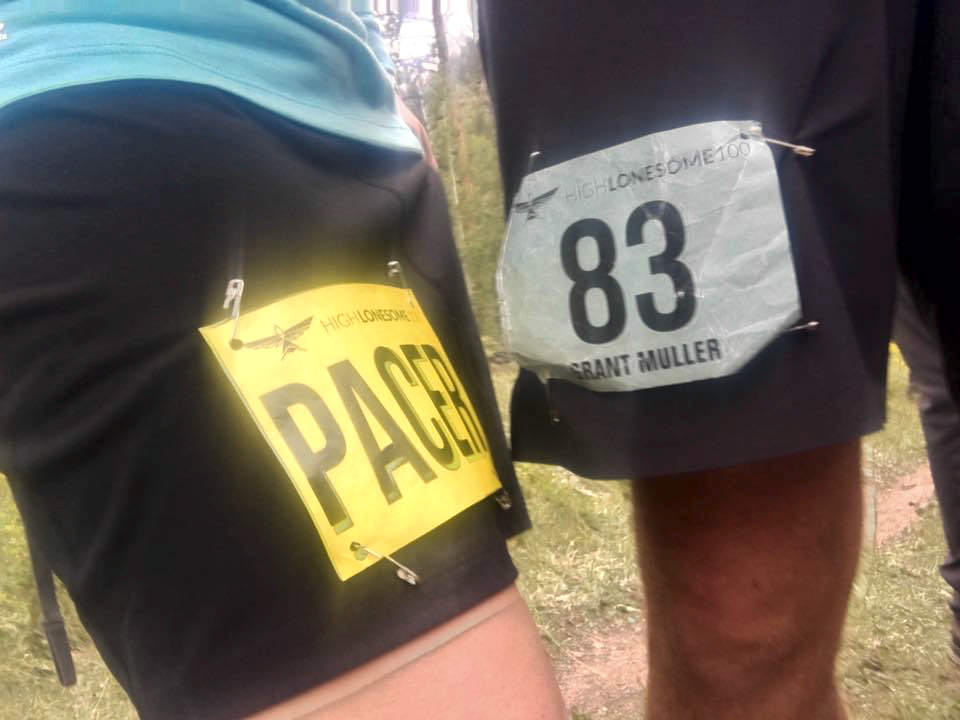
At Raspberry Gulch my wife Cary was going to jump in with me to run it home. This was my first 100, and though Cary has always been the most important member of my crew, I wanted her to experience some the other side of the adventure on this very special run. In the weeks leading up to the race, Cary had joined me on the tail end of several long runs to get a feel for what it would be like. She'd done great! Her background as a gymnast and weightlifter lent itself to running, even if she is a self-avowed endurance hater.
Only a minute or two behind me Aaron and Brooke popped in. We were all set to conquer the last 7.4 miles together. Brooke went to the finish with the crew while Wes and Cary jumped onto the trail with Aaron and I. The run was on.
The first few miles were open and flat, and we made quick work of them. I remembered them from before, and had been looking forward to some easy work at the end to balance things out. Then we hit that steep downhill that I didn't recall. My quads were wrecked. There was no way to take advantage of gravity without doing damage to ankles and knees, despite Wes' insistence that "this is all runnable stuff really. Cha-ching, thats the sound of banking time."
We finally hit the flat open road and agreed to run for the sake of our pacers. We set some goals in the distance. "
"Run to that tree. No, not this tree I meant that one out there."
"Run to that dirt spot. You can't see it? It's right there on your left."
"Run to the last flag. I meant the last last flag, not the first last flag."
Brooke, who'd run back from the finish line towards us, found us with less than 3 miles left. Less than 3 miles of open road were all that separated us from the finish.
You might recall that the race started on a steep downhill road towards the Colorado Trail. Well, what goes down, must come up. We hit the final mile, a steep uphill toward the finish, at a solid, um, hike.
In truth we were making good time. Until now we thought we'd be taking a 34+ hour finish time. Until Wes announced that we had 0.6 miles to go, and almost 15 minutes to do it in, we hadn't entertained the idea that we might finish in less than 34 hours. We picked up the pace, and as the hill leveled out, we settled into a slow jog. Brooke ran ahead to show us just how close the finish was. With 4 minutes to eek out a sub-34 hour finish, Brooke yelled "It's right here!". Cones marking the entrance to the campground came into view. The horses smelled the barn, and we broke into a gallop.
3:57 PM, Saturday
Sprinting with everything left in the tank, Aaron and I crossed the finish line. I did more damage to my body in that minute than I had in over 34 hours of running. As I caught my breath, Caleb handed me a belt buckle and shook my hand. I'm not sure how many goofy smiles Caleb had already seen that day, but I hope mine was the goofiest. The buckle was beautiful. The finish was beautiful. That dirt patch I was sitting on was beautiful. The cheeseburger was beautiful. Oh god, I was tired.
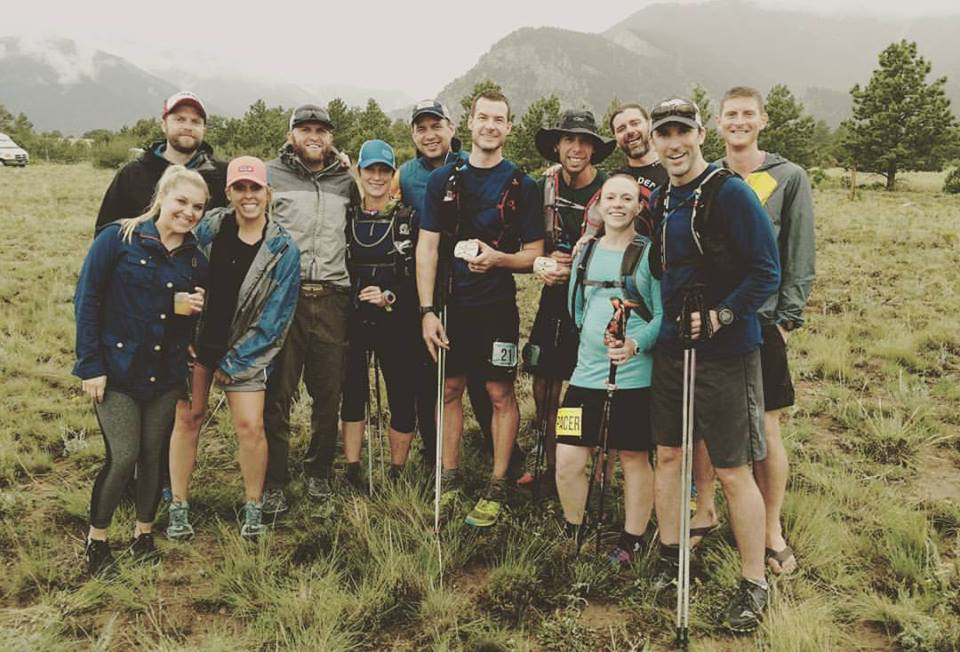
In the minutes after the finish nothing and everything happened. Some folks changed clothes, munched on food, and milled around talking about the race. I was spent. I walked back to the van, took off my shoes, and fell asleep in the passenger seat. Once I had released whatever mental control I had on my body, everything shut down.
But I swear I fell asleep with a smile on my face.
Like never before the race was a team effort. Four runners from the flatlands of Georgia, their crew and pacers, and 100 mountain miles. The volunteers, aid station crews, the race director, the forest service, search and rescue, everyone who has to be involved to make these things work.
I've never felt alone out there, on any race, but this one was special. Being out there with fellow runner Aaron, a 100 mile veteran made it seem easy. Being out there with our pacers Brooke and Wes, both 100 mile veterans made it seem easy. Being out there with my crew from Georgia made it seem easy. Most of all, being out there with my wife Cary, my constant supporter, crew, and now pacer made it seem easy. With all of that support, the mental part of the game takes care of itself. After that, its all physical, and thats the easy part.